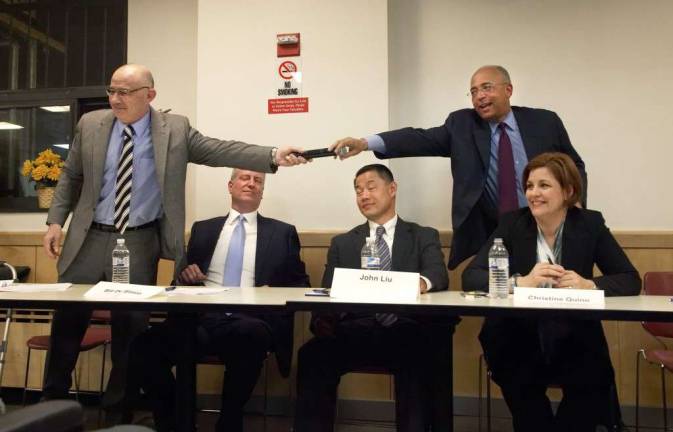Mayoral Hopefuls Face the Upper West Side

Candidates appeared at a recent forum and spoke about real estate and housing concerns By Nora Bosworth "Ken told me that he has not seen a room this crowded since the anti-war debates of the sixties," announced Jason Haber, Chair of Community Free Democrats, who co-sponsored the democratic mayoral debate on Thursday night. Ken Sherrill, Professor Emeritus of Political Science at Hunter College, moderated the panel of five candidates: Sal Albanese, Public Advocate Bill de Blasio, Comptroller John Liu, Council Speaker Christine Quinn, and former Comptroller Bill Thompson. The event filled the Goddard Side Community Center to its capacity, with an estimated 300 to 350 people, according to Joan Paylo, District Leader of the 69th Assembly District, Part B. There were "huge numbers of people turned away," she added. Many attributed the debate's great turnout to the Upper West Side's history of passionate advocacy and political awareness. "The Upper West Side has a long and proud tradition of progressive activism," said Assemblywoman Linda Rosenthal. "This district more than any other, I believe, is the embodiment of democratic values." Rosenthal added that her district always votes "in droves." Excitement reverberated throughout the Community Center as hundreds of local New Yorkers waited to hear the mayoral candidates address issues close to the residents' hearts. Topics ranged from proper budgeting, to which Bloomberg policies the candidates would change first, to which borough the potential mayors know best. (Albanese, de Blasio, and Thompson said Brooklyn; Liu said Queens and Quinn said Manhattan). After a series of playful questions, (when was the last time the candidates paid rent, and how much did they pay?), shouted an audience member: "Let's ask some real questions!" Quickly, the conversation turned to housing. "Can you represent the interests of tenants when you take money from developers?" came the next question. Applause erupted throughout the room. Liu reminded everyone that the question did not apply to him, saying, "Sal and I are the only ones who do not accept contributions from people who do business with city." Albanese came out more aggressively, per usual, against his opponents. "If you think [accepting contributions] has no influence, I can sell you the Brooklyn Bridge," he growled. He added that he alone would not be "wearing handcuffs" if elected mayor. Thompson said his actions spoke louder than any accepted donations. He spoke to his years as comptroller, in which time he brought a spotlight to the failings of the Mitchell-Lama programs, which provides affordable middle-income housing. "We worked to make sure people weren't pushed out of Mitchell-Lama," he said. Quinn touted her record as Council Speaker, saying, "I can tell tenants I can deliver as mayor, because I've delivered as speaker." She cited her passing of the Safe Housing Act, which gives the city power to repair New York's worst buildings, and then bill the landlords for the work. She also praised the Tenant Protection Act that she passed, the first law the city has seen that grants tenants the right to sue landlords over harassment. "The law was so good it was sued by the landlord lobby," she said, half-joking. De Basio came out strongest against private developers. "The real estate industry thinks it has tremendous power in the election and has played favorites over the years," he said. He lauded one of his creations as Public Advocate, The Worst Landlords Watchlist, an online tool that reports and allows one to research the landlords with the most violations in the city. De Blasio said the webpage has helped "thousands and thousands of tenants," and gotten some buildings "out of private hands and into non-profit hands." "That's the kind of leadership I believe in," he declared. But perhaps the most fiery housing issue discussed was the New York City Housing Authority's plans for building market-price condominiums on public housing project land. The Upper West Side's Frederick Douglass housing would be particularly affected if the plans are realized; the Authority intends to erect four new buildings in that area alone. The Housing Authority states that by leasing such prized land to private developers, some fourteen parcels in eight different public housing units, they could pay for the thousands of repairs needed throughout the various projects. The deal would grant the private developers access to the land for 99 years. Among the many concerns voiced by the community and their mayoral candidates was a pervasive skepticism that the Authority is hurting as badly financially as they claim. Adding to this doubt was last year's discovery that the organization was sitting on almost one billion dollars while petitioning the government for more funding. In light of this scandal, their upcoming project, widely known as the "infill plan", has encountered harsh criticism. "NYCHA was sitting on a billion dollars of capital funds," said Liu. "Now they're claiming poverty, that they need a revenue stream; they shouldn't keep piles of money lying around under the proverbial mattress while they go out and ask citizens to pay more." De Blasio, on the other hand, does not doubt that NYCHA is suffering economically. (In his testimony to the New York State Assembly this month, NYCHA Chairman John B. Rhea announced that the organization is currently stuck with "6 billion dollars in unmet capital needs.") Nonetheless, De Blasio stated that the proposal "can't be trusted," and that "people worried about losing housing have every reason to be worried." "Let's call this for what it is," said Thompson, echoing his opponents' views. "A sham." Quinn also voiced her agreement, calling the auctioning off of Housing Authority property to the highest bidder "a terrible idea." "Stop this proposal and stop it right now," Quinn exclaimed, "because we will never get that land back!" The agency plans to sign with developers by November 2014, according to a recently released report. Based on the Upper West Side's history of activism, however, it's safe to say there is more resistance to come.